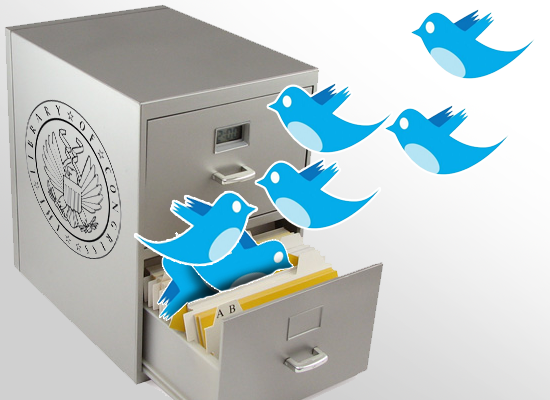If you tweeted anything crazy that you want to take back, it may be too late.
The Library of Congress announced this January that it has completed its archiving of all tweets pursuant to a joint agreement it had with Twitter.
In a document about the project, the Library said at the start of the agreement it was receiving 140million tweets each day and that rate increased to nearly a half billion daily as of October 2012.
Why is the Library of Congress collecting the tweets again?
It says that as “society turns to social media as a primary method of communication and creative expression, social media is supplementing and in some cases supplanting letters, journals, serial publications and other sources routinely collected by research libraries.
Archiving tweets are for research purposes and will “enable future researchers access to
a fuller picture of today’s cultural norms, dialogue, trends and events to inform scholarship, the legislative process, new works of authorship, education and other purposes,” the Libaray writes.
And pursuant to that it has been getting a steady flow of request from researchers already and since it started the archiving process. In its announcement earlier this year it disclosed:
The Library has received approximately 400 inquiries from researchers all over the world since the announcement that it would accept the Twitter archive. Some broad topics of interest expressed by researchers thus far run from patterns in the rise of citizen journalism and interest in elected officials’ communications to tracking vaccination rates and predicting stock market activity. Many inquiries would inform research with policy and regulatory usefulness, such as tracking flu pandemic, citizen responses to candidates’ stances on various issues and tracking public access to court systems. The nature of the queries also varies. For example, requests range from searching for a specific hashtag term to requesting a statistically valid sample of the entire stream
Twitter has become more than a source of micorblogging communication and transmitting links to articles, blog posts and images, it has also become a thorn in the sides of those who tweet out something and later regret it.
Several politicians have had problems in particular.
This Friday, Representative Steve Cohen (D-TN) called a press conference to declare that a tweet he made calling 80s pop star Cyndi Lauper “hot” was actually joke he orchestrated to get the attention of PoliTwoops, the website that monitors politicians tweets. Bizarre, but okay, sure Congressman. The site, run by the Sunlight Foundation, launched last May, and captures, and examines tweets deleted by politicians.
“Sure, we all tweet things we don’t men mean to share, but now politicians have no way to hide them,” the site states in its home page. “Discover tweets that your politicians shared and then deleted.”
We all recall how inappropriate tweets sent to young attractive constituents got former NY Congressman Anthony Weiner (now coming back into the limelight and possibly seeking a NY Comptroller or mayoral bid) in trouble.
A recent report indicated that more members of Congress are using Twitter and hashtags to reach out to their constituents and get them engaged and active on supporting a bill or initiative they are pushing. Equally, studies also indicate that more members of the public are using Twitter to reach their members of Congress as well.
Last year, President Barack Obama launched a social media campaign encouraging Democrats and others to Tweet their Congressman to get them to budge on a budget stalemate.
And even for regular people, sites like Twitchy.com, a site created by conservative firebrand Michelle Malkin, can capture your tweet and share for the world to see.
Twitchy, for example, is known for capturing controversial tweets everyday Americans make on a topic and post them en masse in an article for all to see. The site targets liberals, the media and anyone, generally who tweets something the site considers to attack conservative policies, ideals or leaders.
Having been made the Twitchy list twice already (here and here), I can attest to how being featured in a piece will get you lots of unsolicited attacks and response from Twitchy fans and sometimes they can come after you in rapid cyberbully style at times.
And in fact, anyone can chronicle tweets on a certain topic using desktop services like Storify. No one with a public Twitter account should be out tweeting thinking only their followers will read what they share.
Recently, Twitter enabled its “embed” feature giving everyone the option to embed tweets in a blog post or article. I’ve used it often in one of my blog properties that monitor celebrity tweets. So it’s a wild west out there.
The moral of the story is don’t tweet what you don’t want your future employer, mom, future spouse to not see because you never know when it will get captured and broadcast widely , then come back to bite you in the butt.
Jay Jay Ghatt is also editor at Techyaya.com, founder of the JayJayGhatt.com and JayJayGhatt.com where she teaches online creators how to navigate digital entrepreneurship and offers Do-It-For-You Blogging Service. She manages her lifestyle sites BellyitchBlog, Jenebaspeaks and JJBraids.com and is the founder of BlackWomenTech.com 200 Black Women in Tech On Twitter. Her biz podcast 10 Minute Podcast is available on iTunes and Player.fm. Follow her on Twitter at @Jenebaspeaks. Buy her templates over at her legal and business templates on Etsy shop!



